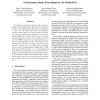Free Online Productivity Tools
i2Speak
i2Symbol
i2OCR
iTex2Img
iWeb2Print
iWeb2Shot
i2Type
iPdf2Split
iPdf2Merge
i2Bopomofo
i2Arabic
i2Style
i2Image
i2PDF
iLatex2Rtf
Sci2ools
119
click to vote
LCN
2003
IEEE
2003
IEEE
A Performance Study of Fast Handovers for Mobile IPv6
We conducted a simulative evaluation of the overall performance of Fast Handovers for Mobile IPv6 in comparison with the baseline Mobile IPv6 using the network simulator ns-2 for a ‘hot spot’ deployment scenario. The simulation scenario comprises four access routers and up to 50 mobile nodes that move randomly and communicate in accordance with the IEEE 802.11 wireless LAN standard. The study provides quantitative results of the QoS improvements obtained by FMIPv6 with respect to handoff latency, packet loss rate and bandwidth per station. The simulation environment allowed us also to investigate the behavior of the protocol in extreme cases, e.g. under channel saturation conditions and considering different traffic sources: CBR, VoIP, Video and TCP transfers. As a complementary part of the study, the signaling load costs associated to the performance improvements provided by the enhancement proposal was analysed. While some simulation results corroborate the intention of the pro...
Related Content
| Added | 05 Jul 2010 |
| Updated | 05 Jul 2010 |
| Type | Conference |
| Year | 2003 |
| Where | LCN |
| Authors | Marc Torrent-Moreno, Xavier Pérez Costa, Sebastiè Sallent-Ribes |
Comments (0)

